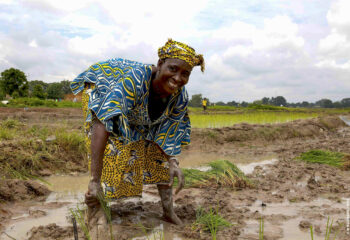A Collective Voice “In unity there is strength.” – Aesop
Smallholder farmers were once seen as solitary figures, toiling alone in their fields. They had no collective voice and found difficulty in getting their crops to a viable market. And when they did, each person struggled alone to receive a fair price. But now, there is a new face of smallholder farming. Increasingly, these once-unaccompanied farmers are organizing as communities that grow and sell their food together. In sub-Saharan Africa, agricultural stakeholders are joining together in agribusiness clusters (ABCs), groups that include necessary actors from all parts of the value chain, from seed suppliers to market businesses. By linking all these people, smallholder farmers have the opportunity to join a community that will help them break out of the poverty cycle. IFDC’s 2SCALE project, among other activities, is strengthening many ABCs by connecting trained smallholder farmer clusters to private sector partners. Nearly 300,000 farmers are involved in this project, benefiting from our CASE approach. In Bangladesh, farmers are involved in the “model village” approach. Model villages demonstrate what collective action can do for a community. By having every farmer use fertilizer deep placement and improved seeds, the community sees widespread increases in farming productivity. Because farmers have more incentive to plant multiple times a year, agricultural land use has increased to 275 percent in some villages where farmers have planted multiple seasons of rice or other crops. The village farmers also aggregate their crops to sell in the market, bringing higher prices and increasing annual incomes by up to 25 percent. Model villages are also creating gender equity, as women farmers join together in producing more vegetables in their home gardens, receiving higher income and giving their families more diverse and nutritious meals. Aesop’s fable rings true, that a bundle of sticks is not easily broken, but that’s just the status quo. By embracing unity, farmers around the world are not only more resilient, they are prospering. The smallholder’s meager fare is becoming a feast. Home gardens are transforming into business ventures. And formerly hungry farmers are feeding the world. Also, be sure to check out one of our most popular training programs Linking Farmers to Markets in Africa (French version), “Comment relier les agriculteurs aux marchés en Afrique.” Be sure to register before June 7! As always, follow us on Twitter @IFDCNews.
Stories like this are made possible
by strong partnerships.
Join us in scaling solutions for food security




